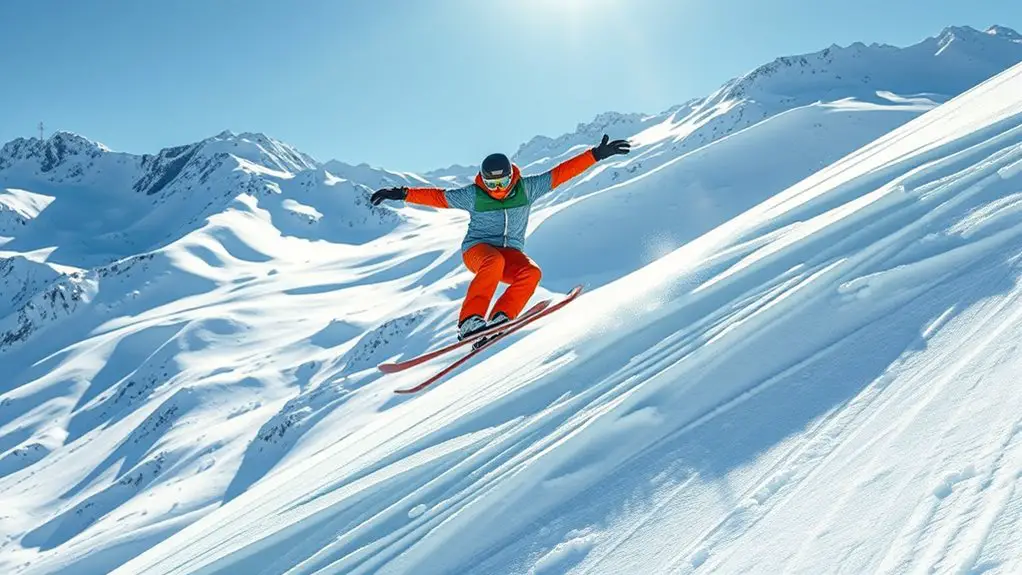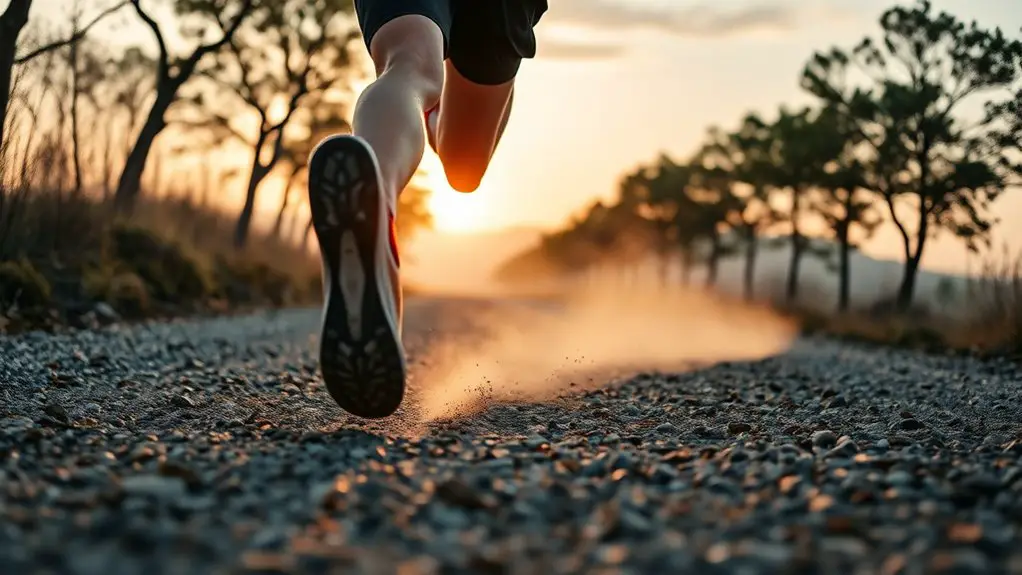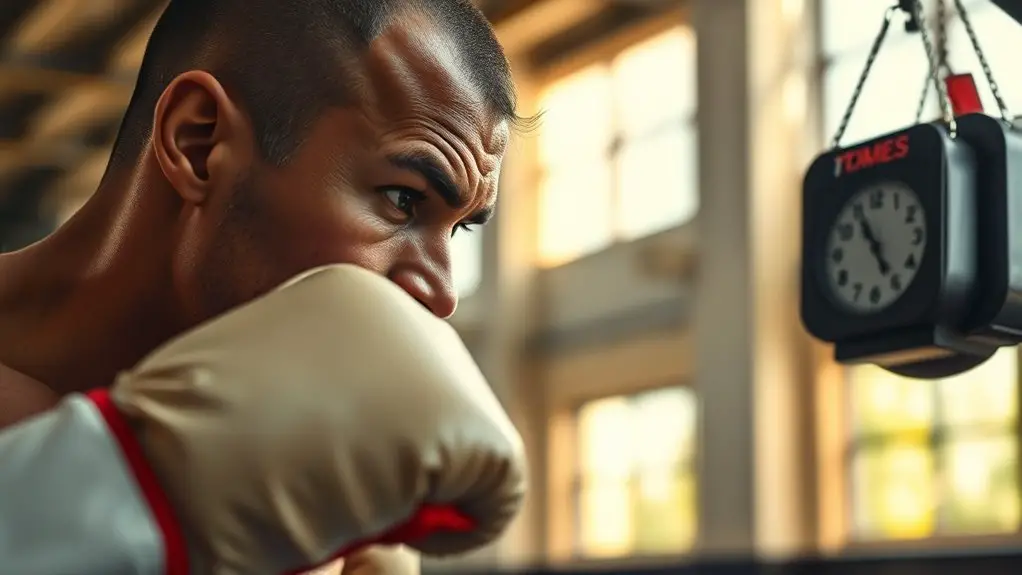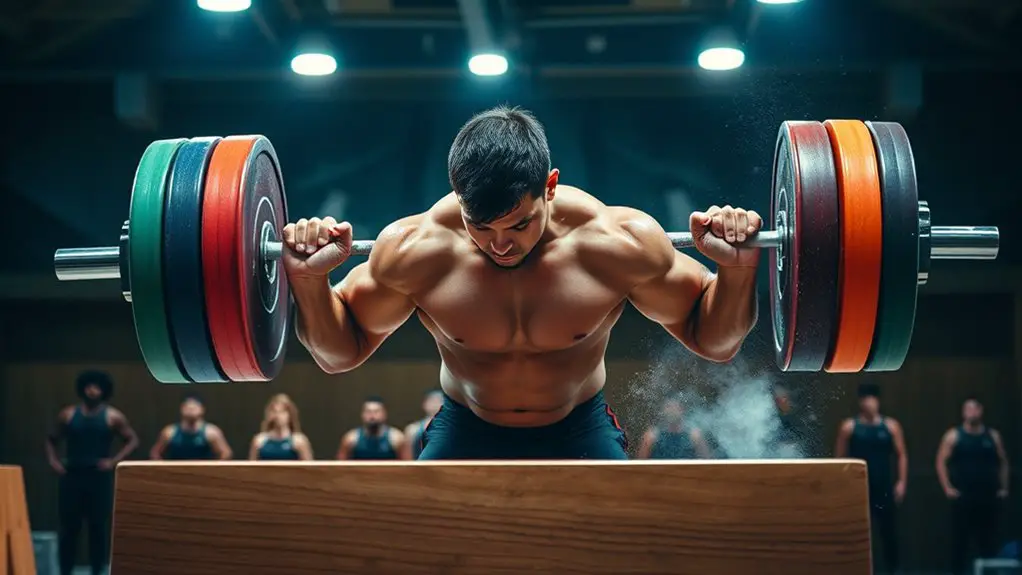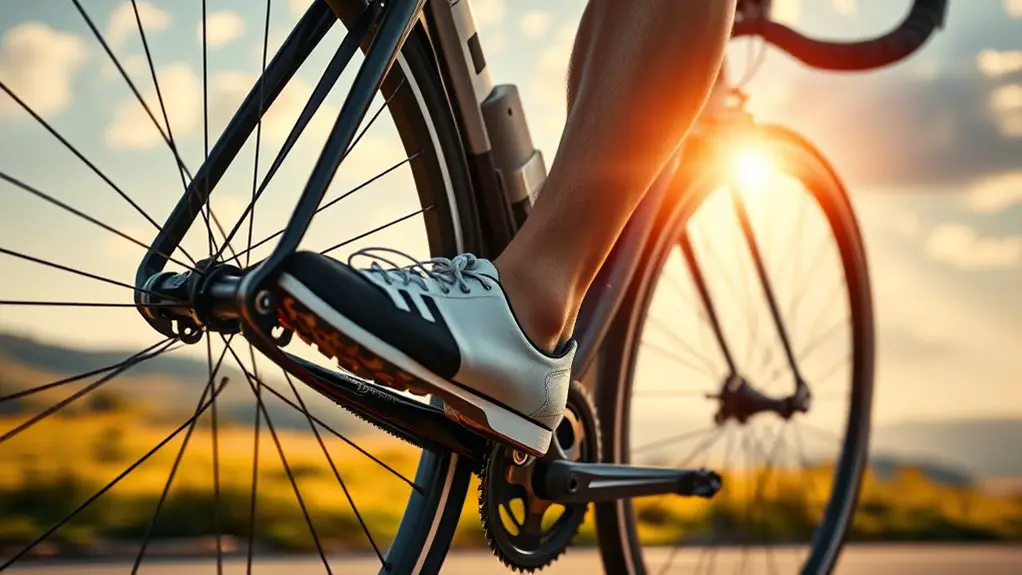Improving your reaction time for freestyle skiing is key to mastering tricks and ensuring safety on the slopes. Focus on enhancing your visual perception and quick decision-making through agility drills like cone weaving and partner reaction exercises. Incorporate plyometric workouts to build explosive power, and practice mindfulness techniques to sharpen your awareness. By training both your body and mind, you'll achieve quicker responses. Keep exploring to discover more effective strategies for refining your skills on the slopes.
Understanding Reaction Time in Freestyle Skiing
Understanding reaction time in freestyle skiing is vital, since it can greatly impact your performance on the slopes. When you're flying through the air or carving down a run, your ability to react quickly to changes in your environment can mean the difference between nailing a trick or taking a spill. Ideal reaction time allows you to execute freestyle techniques with precision, adapting to the terrain and obstacles that come your way.
To enhance your reaction time, it's important to focus on training that sharpens your reflexes. This might involve drills that simulate on-slope scenarios, helping you become more attuned to your surroundings. Practicing visualization techniques can also be beneficial, as it allows you to mentally prepare for various situations before you hit the snow. By honing your reaction time, you'll not only feel more in control but also embrace the exhilarating freedom that comes with mastering freestyle skiing. Additionally, incorporating mental conditioning techniques can further accelerate your response to on-slope challenges.
Key Factors Affecting Reaction Time
Several key factors influence your reaction time in freestyle skiing, making it essential to contemplate them if you want to improve your performance. One major aspect is your visual perception. How quickly you can assess your surroundings and make split-second decisions affects your ability to react to obstacles and opportunities on the slopes. Training your eyes to spot changes in your environment can sharpen this skill.
Another significant factor is muscle memory. The more you practice your movements, the more automatic they become. This means your body can respond faster without needing to think about each action. Engaging in repetitive drills will help solidify these movements, allowing you to react instinctively during a run.
Finally, maintaining a strong mind-body connection is imperative. Staying focused and aware will enhance both your visual perception and muscle memory, ultimately leading to quicker reactions and a more thrilling ride. Additionally, incorporating mindfulness in athletic performance can further improve your ability to stay present and react swiftly in dynamic situations.
Effective Exercises to Enhance Reflexes
Improving your reaction time in freestyle skiing goes hand in hand with specific exercises designed to enhance your reflexes. Embrace the freedom of movement and speed through these effective exercises:
- Plyometric Box Jumps: Build explosive power and quick foot movement with box jumps, focusing on landing softly and immediately jumping again.
- Ladder Agility Drills: Engage in ladder drills to improve foot speed and coordination. Quick, sharp movements will enhance your agility on the slopes.
- Speed Training Sprints: Incorporate interval sprints into your routine. Short bursts of maximum effort will sharpen your reaction time, simulating the quick adjustments needed while skiing.
- Reaction Ball Drills: Use a reaction ball to work on hand-eye coordination. Catch it as it bounces unpredictably, forcing you to react quickly and improve your reflexes. Additionally, regular practice of these exercises leads to significant reflex improvements that can greatly benefit your performance on the slopes.
Mental Training Techniques for Quick Reactions
While physical training is essential, mental training techniques can greatly enhance your reaction time in freestyle skiing. One effective method is using visualization techniques. Picture yourself on the slopes, imagining each jump and turn with precision. This mental rehearsal helps create neural pathways, making your body respond faster when it counts.
Incorporating mindfulness practices is another powerful tool. By being present and focused, you can sharpen your awareness of your surroundings and anticipate changes, which is fundamental in freestyle skiing. Simple breathing exercises can ground you, allowing for quick decision-making. Additionally, meditation enhances mental conditioning by promoting calmness, which is crucial for maintaining clarity during high-pressure situations.
Combine these techniques regularly, and you'll likely notice a significant improvement in your reaction time. Embrace this mental aspect of your training to access your full potential on the slopes, giving you the freedom to express yourself and perform at your best. Your mind is just as important as your body in this exhilarating sport!
Incorporating Reaction Drills Into Your Skiing Routine
Incorporating reaction drills into your skiing routine can considerably boost your performance on the slopes. These exercises sharpen your reflexes, allowing you to respond quickly to changing conditions and obstacles. Here are four effective drills to reflect upon:
- Cone Weaving: Set up cones on a flat slope and weave in and out. This will enhance your agility and speed, essential ski techniques for maneuvering tight spaces.
- Partner Reaction: Have a friend randomly call out commands or point in different directions while you ski. This helps improve your ability to react to unexpected situations.
- Obstacle Course: Create an obstacle course with various objects. This simulates real-life challenges you might face while skiing.
- Timed Runs: Time your runs down a slope and focus on quick turns and reactions. Competing against your own time pushes you to improve.
Incorporating these drills will give you the freedom to ski with confidence! Additionally, agility training techniques such as lateral shuffles and cone drills can further enhance your reaction time on the slopes.
Frequently Asked Questions
How Does Nutrition Impact Reaction Time in Freestyle Skiing?
Nutrition plays an essential role in your reaction time, especially with carbohydrate timing and hydration strategies. By fueling your body with the right carbs before and during your activity, you can maintain energy levels and sharpen your focus. Staying hydrated is equally important; it helps with cognitive function and keeps your reflexes quick. When you nourish yourself properly, you're setting yourself up for success, allowing you to embrace the freedom of movement on the slopes.
Are There Specific Warm-Ups to Enhance Reaction Time?
To enhance your reaction time, incorporating specific warm-ups can make a big difference. Start with dynamic stretches to loosen up your muscles and increase blood flow. Follow that up with agility drills, like ladder drills or cone sprints, to sharpen your reflexes and improve coordination. These activities not only prepare your body but also give you the freedom to respond quicker in any situation, enhancing your overall performance.
What Role Does Sleep Play in Athletic Reaction Speed?
Sleep plays an essential role in your athletic reaction speed. When you get quality sleep, it enhances your cognitive function, allowing you to process information faster and respond more effectively. Poor sleep can lead to sluggishness and impaired decision-making, which can hinder your performance. So, if you want to feel free and agile in your sport, prioritize good sleep habits. You'll notice a significant improvement in your reaction times and overall performance.
Can Age Affect My Reaction Time in Skiing?
Yes, age can affect your reaction time in skiing. As you grow older, you might experience an age-related decline in speed and coordination, making quick responses more challenging. However, you can combat this with cognitive training, which sharpens your mental agility and decision-making skills. Embracing activities that keep your mind and body agile can help you maintain that sense of freedom on the slopes, regardless of your age.
How Do Injuries Influence Reaction Time Recovery?
Injuries can greatly influence your reaction time recovery. During injury rehabilitation, you're not just healing physically; you're also building mental resilience. It's a challenge that tests your limits, but embracing this process can enhance your overall performance. You'll discover that overcoming obstacles strengthens not just your body but your mind too. Focusing on regaining your freedom to move will help you bounce back stronger and quicker than before.
